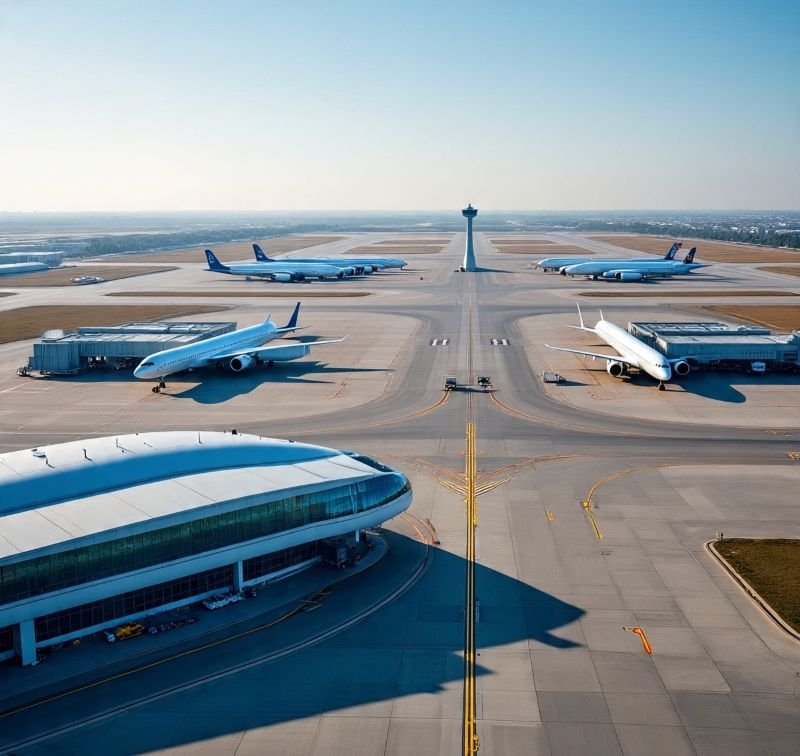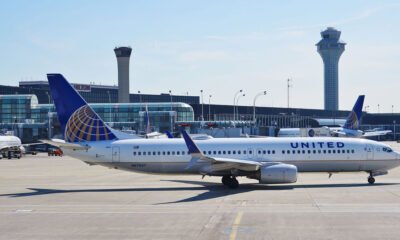Flight Buzz
Madrid, Barcelona, Malaga, Ibiza, and Palma de Mallorca Among Spanish Airports Hit by Nationwide Baggage Handler Strikes Disrupting Flights Travelers Urged to Reassess Travel Insurance Before Flying with Ryanair All You Need to Know

Published on
August 7, 2025 |
By: TTW News Desk
Global Aviation on Alert Amid Spain’s Airport Worker Strike
It was reported that a substantial wave of travel disruption began brewing with the announcement that over 3,000 baggage handling staff in Spain would launch a long-term strike starting mid‑August, prompting widespread concern across the global aviation sector. Observers emphasized that because Spain acts as a critical European transit hub, flight schedules and international itineraries around the world were likely to be adversely affected.
Passengers traveling through Spanish airports, particularly those passing onward to other destinations, were cautioned that any operational delays in Spain could trigger cascading disruptions far beyond national boundaries. Analysts noted that this situation had the potential to derail connections, delay departures, and create knock-on effects across airlines unfamiliar with the strike’s direct involvement but reliant on Spanish ground services.
At the core of the unrest were more than 3,000 baggage handlers employed by a ground services operator. It was pointed out that disruptions to baggage processing—a seemingly behind-the-scenes operation—could have visible consequences on flight punctuality, passenger experience, and airport throughput internationally.
Strike Launches August 15 Across a Dozen Major Hubs
It was confirmed that the labour action would officially start on August 15, impacting 12 primary airports in Spain:
- Madrid‑Barajas
- Barcelona‑El Prat
- Valencia
- Seville
- Alicante
- Ibiza
- Malaga
- Palma de Mallorca
- Tenerife South
- Girona
- Lanzarote
- Santiago de Compostela
It was disclosed that the strike would unfold during three critical daily time frames: from 05:00 to 09:00, 12:00 to 15:00, and 21:00 to 23:59, aligning with peak operational windows in airport schedules. Travelers with flights during these periods were warned of elevated risk of delays and procedural slowdowns
Furthermore, sources emphasized that after the initial three days—August 15, 16, and 17—the strike would recur every Wednesday, Friday, Saturday, and Sunday until the end of 2025, transforming it from a short-lived event into a sustained challenge for airline operations and passenger movement through Spain
Underlying Causes: Workers Demand Fair Conditions
Reports indicated that the strike was the culmination of mounting frustration among ground workers over what they alleged were systemic violations of labour rights and unstable employment conditions. Unions such as UGT and CGT had pointed to coercive overtime policies, punitive disciplinary sanctions (including unpaid suspensions of up to 36 days) for refusing extra hours, and a lack of consolidated schedules for part-time staff as key grievances
Union leaders argued that these practices created insecurity and disregard for existing labour agreements governing pay, scheduling, and job stability. The action, they insisted, was intended to force meaningful negotiation toward improved, lawful working conditions for more than 3,000 employees nationwide
Passenger Impact: Delays, Baggage Mix‑ups, and Itinerary Chaos
Travel experts and union statements both acknowledged that even though minimum service levels would legally remain in force, the repeated, large‑scale stoppages during critical hours were expected to cause major slowdowns. Baggage processing backlogs, slower aircraft turnarounds, and check-in delays were all flagged as probable consequences
Passengers were urged to avoid checking luggage where possible, with carry‑on only travel offering the most reliable way to reduce exposure to lost or delayed baggage. Lessons drawn from past incidents—including luggage not arriving for days—reinforced this advice
Travelers were also reminded of compensation rights under EU 261/UK 261, which may apply if flight delays exceed three hours—unless the strike is deemed an extraordinary circumstance. In previous rulings, strikes by subcontracted ground workers had not automatically exempted airlines from compensation responsibilities, suggesting that passengers could have strong grounds for reimbursement if flights were delayed or cancelled
Insurance and Policy Caveats: What Everyone Must Check
It was noted that most standard travel insurance policies did not automatically cover industrial action unless explicitly included as an add-on or higher-tier benefit. Travelers were strongly advised to review their policy terms carefully to determine whether strike disruption, missed connections, or overstays due to delays were included in coverage.
Important points to confirm included:
- Whether the strike classifies as a “known event” at the time of purchase—policies often exclude coverage for events that were public knowledge at purchase.
- Whether missed departures, accommodation costs, or alternative transport expenses were incorporated.
- Whether the policy clearly covers industrial action and includes provisions for extended delays, stranded travellers, or rebooking costs.
Travelers who had already booked were encouraged to contact their airline immediately to ask about rebooking, alternate routing, or compensation options. Those planning trips ahead were urged to select policies with disruption add-ons and to retain all receipts for potential claims. Adjusting to avoid strike days or hours, if feasible, was highlighted as a practical strategy to limit risk.
Wider Effects on Season‑Long Tourism
Given the strike’s scheduled continuation through 30 December 2025, its impact was projected to extend well beyond the summer holiday season into autumn, winter, and even early 2026. Major airports, particularly Madrid, Barcelona, and Palma de Mallorca, were expected to bear the brunt of ongoing disruption
Some industry analysts predicted that frustrated travelers might reroute through alternate airports in neighboring countries, shifting tourism flows and putting additional strain on airports without the infrastructure to handle sudden surges. Such changes could also impact booking patterns, accommodation demand, and the overall mood around travel to Spain.
Recommendations for Travelers Leaving Soon
It was suggested that passengers with travel plans involving any of the listed Spanish airports take specific steps to minimize inconvenience:
- Verify coverage for strike-related disruptions in insurance policies immediately.
- Understand the definition of a “known event” within the policy terms, which can affect eligibility.
- Contact your airline early to confirm options for rebooking or compensation.
- Document always unforeseen costs such as extra hotels, meals, or transport.
- Where possible, book flights outside of strike windows—especially avoiding check-in and baggage during the outlined timeframes.
These precautions were considered essential for maintaining control over potentially chaotic travel experiences, reducing both stress and financial exposure.
Portable Luggage, Delays, and Destination Confidence
Industry voices pointed out that travelers who strictly packed carry‑on only stood the best chance of avoiding delay issues tied to lost or held luggage. Reddit users recounted stories of unchecked bags failing to arrive for days during similar stoppages, underscoring the wisdom of securing essentials aboard one’s person
If disruptions grew persistent, it was forecast that tourist confidence in Spain—notably during busy seasons—could decline. Some vacationers might redirect plans to destinations perceived as more stable. This shift could erode demand in regions like Barcelona, Malaga, Ibiza, and the Balearics, prompting local tourism services to adapt quickly to reduced footfall or altered timing of arrivals.
Economic and Operational Ramifications Across the Industry
Travel analysts emphasized that the ripple effects of the strike would affect not only individual travelers but also industry operations and revenue flows. Airlines might need to reschedule flights, adjust turnarounds, and allocate additional buffer time between connections to compensate for slower baggage handling.
Airport infrastructure could face bottlenecks, particularly in shared areas where multiple airlines used the same cargo belts or ramp equipment—delays in one zone could cascade into adjacent terminals. Ground‑handling limitations could create aircraft stacking, queueing issues, and delays impacting on-time performance metrics.
Tourism providers—hotels, restaurants, local attractions—might see changes in arrival times, cluster demand shifts, and increased customer service queries. The need for transparent communication and flexibility became paramount for service providers in retaining traveler trust.
The Underlying Story: Workers With Grievances Demand Change
As coverage made clear, labor representatives detailed several reasons behind the escalation, including alleged imposition of overtime hours without consent, disciplinary actions for signing off from mandated extra shifts, lack of transparent bonus and compensation structures, and restrictions on returning to work post‑medical leave.
Unions had demanded that sanctions be lifted, work conditions formalized, and meaningful negotiations initiated to improve contracts for over 3,000 employees across Spain. The failure to engage meaningfully was stated as a key reason the fourth quarter 2025 strikes remained scheduled
How the Travel Industry Must React
Travel industry leaders were urged to:
- Closely monitor the transport ministry’s declaration of minimum service levels, which under Spanish law would determine how many operational functions must continue even during strikes.
- Communicate clear guidance to travelers about arrival advisories, check-in times, and compensation rights, especially in the context of EU 261 and UK equivalents.
- Prepare contingency staffing and logistics adjustments to soften potential knock-on effects, such as deploying mobile stairs or reassigning baggage equipment.
- Advise passengers to build in extra time for connections through Spanish airports, or offer alternative routes where possible.
Such preparation was considered essential to mitigate the strike’s impact and preserve booking confidence during volatile travel windows
The Bigger Picture: A European Strike Trend?
It was remarked that this strike in Spain reflected a broader wave of labour unrest in the aviation sector across Europe, where increasing staff shortages and rights disputes were pushing unions into action. This trend suggested that similar disruptions could arise elsewhere, making proactive planning critical for travel stakeholders and holiday planners alike.
Final Reflection
It was underscored that the unfolding ground‑handling strike in Spain—spanning dozens of weekends and peak travel slots—reflected more than a personnel dispute; it symbolized a deeper fracture in operational trust and worker rights frameworks.
Travelers, airlines, and hospitality providers were encouraged to:
- Stay informado and monitor how the strike evolves through December 2025.
- Promote flexibility in itineraries and encourage insurance with disruption coverage.
- Leverage communication to maintain customer confidence, especially when compensating for delays or rebooking.
Despite its projected duration, it was suggested that with careful planning and transparency, the disruptions could be managed well enough to preserve travel experiences worldwide—even in the face of one of the most prolonged airport workforce actions of recent memory.
Highlights to Remember:
- Over 3,000 baggage handlers across Spain are involved in the strike.
- Strikes commence on 15 August 2025, covering 12 major airports, including Madrid, Barcelona, Valencia, Seville, and Palma de Mallorca.
- Work stoppages occur during 05:00–09:00, 12:00–15:00, and 21:00–23:59, then repeat Wednesday, Friday, Saturday, and Sunday through the end of 2025.
- Travelers are urged to verify travel insurance coverage, particularly for industrial action or known events.
- Carry‑on only travel is recommended to minimize risk of lost or delayed baggage.
- The strike is likely to cause global flight ripple effects, with potential tourism shifts away from Spain, as holiday plans adapt.
- Industry stakeholders should plan proactively, update passengers, and adapt logistics to maintain service in turbulent conditions.
Flight Buzz
United Airlines Cancel and Delay Over 650 Flights in US as Travel Disruption Continues in the Wake of a IT Outage, Including Denver, Miami, Houston, Los Angeles, Chicago, and More

Published on
August 8, 2025 |
By: TTW News Desk
A crippling IT outage sent United Airlines and its passengers into a two-day spiral of travel chaos this week, with the fallout from the resolved glitch continuing to disrupt operations across the US through Thursday. The failure of the airline’s critical “Unimatic” flight information system on Wednesday triggered a logistical meltdown that ultimately impacted over 1,700 flights. While the system was restored Wednesday night, the airline continued to struggle with displaced aircraft and crews, resulting in 164 cancellations and 489 delays on Thursday alone. This compounded the turmoil from the initial outage on Wednesday, which saw 218 flights cancelled and approximately 1,100 delayed, leaving thousands of passengers stranded at major hubs including Chicago, Denver, Houston, and Los Angeles.
As of Today, departure boards in United’s major hubs were still a sea of red, with 164 flights cancelled and another 489 delayed. This operational paralysis was the direct result of a far more intense breakdown on Yesterday, when the system failure first occurred, leading to 218 cancellations and a staggering 1,100 delays.
A massive two-day travel meltdown engulfed United Airlines this week after the failure of its critical “Unimatic” IT system, ultimately disrupting over 1,700 flights. The chaos peaked on Wednesday when 218 flights (7%) were cancelled and approximately 1,100 flights (35%) were delayed. The logistical fallout continued to plague the airline through Thursday, where another 164 flights (5%) were cancelled and 489 flights (15%) were delayed as the carrier struggled to reposition aircraft and crews. This widespread disruption was felt across the entire network, impacting routes of all types, from major international services like UAL146 between Newark and London, to key cross-country connections such as UAL796 from San Francisco to Boston and UAL2276 from Los Angeles to Chicago, and even shorter regional hops like UAL1476 from Denver to Kansas City, leaving thousands of passengers stranded at its major hubs.
The Anatomy of a Meltdown: A Legacy System Fails
At the heart of the crisis was a failure in United’s “Unimatic” system. This is a “legacy system”—older but essential software that acts as the digital backbone for the airline’s flight operations. It houses the foundational data for nearly every flight, including routing information, flight times, and critical weight and balance calculations needed for safe takeoff.
When Unimatic went down for several hours Wednesday night, it was like a nerve center being severed. Though IT teams managed to resolve the outage by late evening, the damage was already done. The incident, which United confirmed was not a cybersecurity breach, triggered a logistical domino effect that would take days to untangle.
The key problem is that a resolved IT issue doesn’t instantly put aircraft and flight crews back where they need to be. A plane that was scheduled to fly from Chicago to Los Angeles on Thursday morning might have been the same aircraft that was stuck on the tarmac in Denver the night before. Similarly, a flight crew’s legally mandated duty hours may have expired while they waited for a resolution, making them ineligible to pilot their next scheduled flight. This cascading failure of positioning and scheduling is why the disruptions continued long after the servers were back online.
Response and Nationwide Impact
As the crisis unfolded, the Federal Aviation Administration (FAA) stepped in, issuing a ground stop that halted United flights destined for its Chicago hub to prevent the airport from being completely overwhelmed. The impact was felt across the entire network, affecting flights of all types. Major cross-country services like UAL796 from San Francisco to Boston and key hub connections such as UAL2276 from Los Angeles to Chicago faced significant delays. The problems extended to international gateways, with flights like UAL146 from Newark to London Heathrow caught in the snarl. Even shorter regional routes, including UAL2074 from Denver to Rapid City, were not immune, illustrating how the failure of a single system could paralyze an entire network.
United’s public relations team worked to manage the fallout, issuing statements apologizing for the disruption and reaffirming that safety was its top priority. The airline assured customers it was working to rebook them and would cover expenses like hotels and meals in accordance with its policies.
Now, as the airline works to clear the backlog and restore a normal schedule, its larger challenge will be to restore the confidence of the thousands of passengers who were caught in the crossfire of a brief but catastrophic system failure.
Flight Buzz
American Airlines Announces New Flights To Budapest, Athens, And More For Summer 2026

Published on
August 8, 2025 |
By: TTW News Desk
American Airlines will broaden its international footprint in Summer 2026 by introducing six new routes serving vital markets in Europe and South America. This expansion not only deepens the airline’s footprint across the Atlantic basin but also provides U.S. travelers and those in Europe with additional, convenient nonstop choices. The new flights promise heightened schedule flexibility and streamlined connections for vacationers and business travelers alike.
The nonstop links will launch from Philadelphia (PHL), Dallas-Fort Worth (DFW), and Miami (MIA) and will span Budapest, Prague, Athens, Milan, Zurich, and Buenos Aires. These added markets complement the airline’s already robust transatlantic and South American portfolio and reinforce American’s commitment to increasing global service breadth and frequency.
American Airlines will for the first time offer seasonal service to both Budapest and Prague, thereby establishing nonstop access to the strategic and historically rich markets of Central Europe.
Philadelphia to Budapest and Prague
Commencing May 21, 2026, American Airlines will launch daily nonstop service from Philadelphia to Budapest and Prague, utilizing the Boeing 787-8 Dreamliner to bolster access to two culturally and historically rich capitals. The new Budapest route will represent the carrier’s inaugural service to Hungary, further underlining the increasing traveler interest in the nation’s famed thermal baths and UNESCO World Heritage sites. The nonstop service to Prague will also constitute the first direct link from Philadelphia, enabling convenient same-day arrivals to the Czech Republic’s storied cityscape of bridges, castles, and vibrant arts.
Dallas Fort Worth to Athens and Zurich
On the same date, American will add daily nonstop flights from Dallas Fort Worth to Athens and Zurich, employing the 787-8 for the Greek capital and the 777-200 for the Swiss metropolis. The new Athens route will meet surging demand for direct access to Greece’s storied coastline and island-hopping itineraries, while the Zurich service will connect U.S. travelers to the heart of the Swiss financial center, ski regions, and broader European high-speed train networks. Together, the new flights will affirm American’s role as a premier gateway for travelers seeking the Mediterranean and Central European experience.
Through the addition of these new links, Dallas/Fort Worth International Airport will solidify its position as a pivotal gateway for travelers journeying to Southern Europe. For travelers to Greece, the new Athens service will elevate the number of U.S. cities with nonstop flights to five, streamlining travel to the ancient capital. Zurich-bound passengers will benefit from a seamless connection to the Swiss financial heart, since these direct flights will now depart from one of the nation’s largest travel hubs.
Miami will acquire daily year-round service to Milan’s Malpensa Airport starting March 29, 2026. The new flight will further cement American Airlines’ extensive network at Miami International Airport, already among its most vital hubs. Milan’s rich cultural scene, fashion heritage, and robust business environment will now be within nonstop reach of South Florida, tightening the transatlantic bond between the U.S. and Italy.
The flight will close a longstanding gap in transatlantic connectivity, offering a direct link between Miami and Milan that eliminates the inconvenience of layovers and provides business and leisure travelers with a streamlined option.
Service Expansion to South America
In conjunction with its planned growth throughout Europe, American Airlines is set to broaden its footprint in South America. Beginning May 21, 2026, the airline will add a seasonal extension to its Dallas-Fort Worth to Buenos Aires (EZE) service, operating weekly across the Continental summer travel period and concluding on August 3, 2026. This additional capacity is designed to accommodate robust demand for travel between the United States and Argentina while reinforcing American Airlines’ strategic positioning as a leading carrier for the South American market.
By complementing existing Miami schedules with added Dallas-Fort Worth frequencies, American Airlines will provide the itinerary flexibility and connectivity that business and leisure passengers require when travelling to Buenos Aires.
Dedicated Options for Sports Travelers
In service to international sports marquee events in 2026, American Airlines will similarly offer a limited-time seasonal service connecting Dallas-Fort Worth and Zurich (ZRH) and will grow frequencies from Miami and Dallas-Fort Worth to Buenos Aires (EZE). The Zurich flights will operate from May 21 through August 4, 2026, and will be the only nonstop link between the two cities. This offering is tailored for sports enthusiasts travelling to Zurich for the 2026 FIFA World Cup and a calendar of associated global tournaments.
American Airlines will bolster its service to Buenos Aires during next summer’s peak season by adding up to three additional daily departures from Miami, providing travelers to Argentina with greater flexibility and connection options.
To further elevate the passenger experience on long-haul sectors, the carrier will increase the premium seat count on flights to Asia and Europe. Effective March 29, 2026, Dallas/Fort Worth will introduce daily Boeing 777-300ER service to Tokyo Haneda, raising the number of premium seats by more than 45 percent compared to the summer of 2025. Los Angeles, meanwhile, will double its Haneda footprint, operating two daily 777-200 flights.
Every long-haul service to Asia will come equipped with sleeping attire, memory foam mattress toppers, multicourse dining, and an expanded selection of award-winning wines, aligning the travel experience with the carrier’s emphasis on comfort.
America’s Summer 2026 expansion reaffirms its commitment to enhancing international reach. Launch routes to Budapest, Prague, Athens, Milan, Zurich, and the newly expanded Buenos Aires schedule collectively deliver greater choice and convenience to the airline’s passengers as travel demand continues to rise.
These new routes further enhance American Airlines’ extensive global network while consolidating its status as a frontrunner in transatlantic and intercontinental service. Ongoing growth is accompanied by a sustained dedication to delivering superior service and premium cabin offerings, guaranteeing that every traveler enjoys a smooth and gratifying journey from departure to arrival.
(Source: American Airlines, U.S. Department of Transportation, Airlines for America, International Air Transport Association)
Flight Buzz
Air Transat Expands to Brazil with New Nonstop Flights to Rio de Janeiro for Winter 2025-26

Published on
August 8, 2025 |
By: TTW News Desk
Air Transat is making a big push to Brazil with new nonstop flights from both Toronto and Montreal to Rio de Janeiro beginning in the winter 2025-26 season. The new offering is part of the carrier’s ongoing growth strategy focused on increasing presence in existing southern leisure and transatlantic markets.
New Service to Rio de Janeiro
The Canadian carrier will operate flights from Toronto Pearson to Rio de Janeiro Galeão International Airport twice a week, on Wednesdays and Saturdays. Additionally, it will offer a once-weekly service from Montreal-Trudeau Airport on Thursdays. All flights will be operated using the modern Airbus A330 aircraft, ensuring comfort and efficiency for travelers.
Following Air Canada’s announcement of its Toronto to Rio de Janeiro route set for December 2025, Air Transat introduces its own direct service to the Brazilian city. Until now, Montreal has lacked a direct link to Brazil, making Air Transat the first Canadian carrier to fill this gap, offering direct access to the Brazilian metropolis for the first time.
Market Insights
Brazil has long been a popular destination for Canadian travelers, with Toronto–São Paulo being the largest city pair between the two countries in 2024. Additional key routes feature flights from Montreal and Vancouver to São Paulo. According to Sabre Market Intelligence, Canada–Brazil traffic saw 352,000 passengers in 2024, marking a slight decrease of 1.6% from the previous year. Despite this, the demand for direct routes to Rio de Janeiro has remained strong, especially with Air Transat now serving as a direct option from Montreal and Toronto.
A Strategic Network Expansion
This new route to Brazil is a key element of Air Transat’s broader plan to enhance its network during the winter 2025-26 season. The airline is adding 14 new routes and increasing frequencies across key markets, reflecting a roughly 6% increase in capacity year over year. Alongside Brazil, Air Transat is also launching new routes to Guadalajara, Valencia, Madrid, Bordeaux, and Istanbul. This expansion will not only increase the airline’s footprint in the southern leisure markets but also cater to the growing demand for transatlantic travel.
New Routes from Smaller Markets
In addition to these new international destinations, Air Transat will also operate seasonal flights to popular Southern destinations from smaller Canadian markets such as Charlottetown, Windsor, and Fredericton. This move is aimed at providing more Canadians with access to international destinations, while also tapping into underserved markets.
A New Era of Connectivity Between Canada and Brazil
Air Transat’s entry into the Brazil market signals a new era of connectivity between Canada and Brazil, especially for Montreal residents who have previously had limited direct flight options to Rio de Janeiro. The new service will provide a convenient and seamless travel experience, catering to the growing demand for international leisure travel to one of South America’s most iconic cities.
With the expansion of its network, Air Transat continues to position itself as a key player in the competitive leisure travel sector. The new nonstop flights to Rio de Janeiro, alongside other seasonal additions, will further enhance the airline’s ability to meet the needs of travelers seeking new destinations and exciting holiday experiences.
Introduction of Rio de Janeiro and service to Brazil is also great news for Canadian travellers who can enjoy this new destination with Air Transat. With direct flights from Toronto and Montreal, the airline will prove to be an important driver of tourism development between Canada and Brazil. This expansion and additional routes will help to cement Air Transat’s status as the leader in leisure travel, accommodating the increased demands of vacation and business flyers.
-

 Brand Stories3 weeks ago
Brand Stories3 weeks agoBloom Hotels: A Modern Vision of Hospitality Redefining Travel
-

 Brand Stories2 weeks ago
Brand Stories2 weeks agoCheQin.ai sets a new standard for hotel booking with its AI capabilities: empowering travellers to bargain, choose the best, and book with clarity.
-

 Destinations & Things To Do3 weeks ago
Destinations & Things To Do3 weeks agoUntouched Destinations: Stunning Hidden Gems You Must Visit
-

 Destinations & Things To Do2 weeks ago
Destinations & Things To Do2 weeks agoThis Hidden Beach in India Glows at Night-But Only in One Secret Season
-

 AI in Travel3 weeks ago
AI in Travel3 weeks agoAI Travel Revolution: Must-Have Guide to the Best Experience
-

 Brand Stories1 month ago
Brand Stories1 month agoVoice AI Startup ElevenLabs Plans to Add Hubs Around the World
-

 Brand Stories4 weeks ago
Brand Stories4 weeks agoHow Elon Musk’s rogue Grok chatbot became a cautionary AI tale
-

 Brand Stories2 weeks ago
Brand Stories2 weeks agoContactless Hospitality: Why Remote Management Technology Is Key to Seamless Guest Experiences
-

 Asia Travel Pulse1 month ago
Asia Travel Pulse1 month agoLooking For Adventure In Asia? Here Are 7 Epic Destinations You Need To Experience At Least Once – Zee News
-

 AI in Travel1 month ago
AI in Travel1 month ago‘Will AI take my job?’ A trip to a Beijing fortune-telling bar to see what lies ahead | China













You must be logged in to post a comment Login